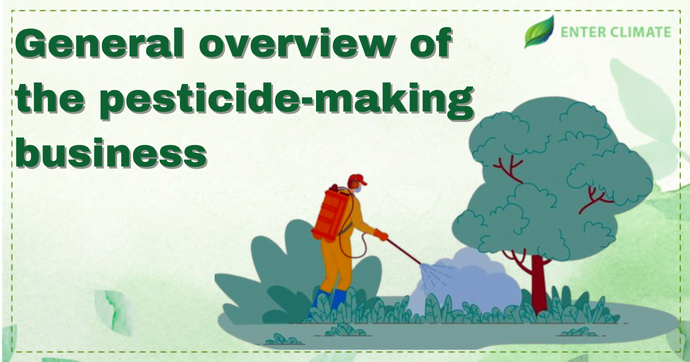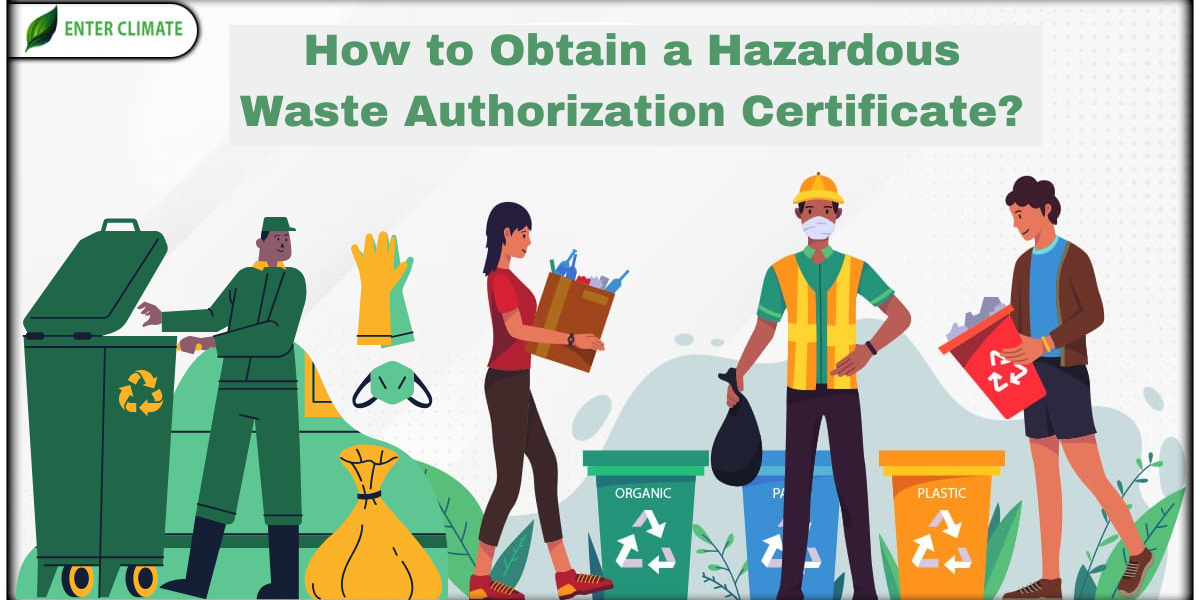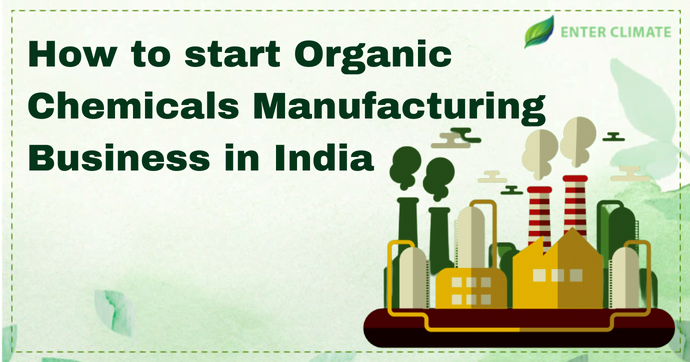General overview of the pesticide-making business
 19 Nov, 2022
19 Nov, 2022 
Pesticides making business is undoubtedly essential. Pesticides are indeed a boon for farmers as they help protect crops from diseases, pests and weeds and grow more food on less land. These also help in boosting productivity per hectare. Just as people require medicine when ill, plants need pesticides when affected by pests, diseases or weeds. In addition, these are used in foggers, for pest control and so on.
Types of pesticides
Before proceeding with pesticides making business, it is essential to know about the different types of pesticides. These are as follows –
- Insecticides–used to kill insects are
- Fungicides–used to kill parasitic fungi or their spores
- Nematicides – manage nematodes or roundworms
- Herbicides – commonly known as weedkillers, these are used to control undesired plants or weeds
Eligibility for starting the pesticide-making business
The following section describes the eligibility that one must fulfil to start pesticide making business –
- The person anticipating starting the business must be above 18 years.
- The person wishing to start the pesticide-making business must be trained by CFTRI/NIPHM in a pest management program.
- The person must have at least one year of practical pesticides applications experience as registered.
- The person must have a degree in the field of science.
- The person must be licensed by the structural pest control board as an operator.
The Pesticide Management Act, 2020
Besides setting the criteria for fulfilling the eligibility, the Pesticide Management Act (PMA), 2020, was also introduced. The PMA is a bill to regulate pesticides, including their import, manufacture, packaging, pricing, labelling, storage, sale, advertisement, transport, use, distribution and disposal. This is done to guarantee the availability of effective and safe pesticides. Additionally, it is essential to strive to reduce risk to animals, human beings, living organisms other than pests, and the environment. Furthermore, the endeavours to promote biological pesticides. So, even before opting for pesticide-making business registration, adhering to the rules stipulated under the Act is imperative.
Nodal authority
The Pesticides Management Act mandates the Central Government to formal registration Committee (RC), which will be the nodal authority to approve or deny pesticide-making business registration. Besides, the Committee will perform the following functions –
- specify conditions according to which a registration certificate is granted;
- make decisions related to the application received by it for pesticides registration;
- Review the pesticides registration on behalf of which a reference is made or that is banned by the State or the Central Government as per section 35;
- Periodically review the efficacy and safety of registered pesticides and cancel or amend registration certificates;
- inform about the substances possessing pesticidal properties;
- Preserve a national register of pesticides; and
- Other such roles and responsibilities as stated by the Central Government.
Registration of pesticides for the pesticide-making business
Following are specific guidelines under the PMA that the owner of the pesticide-making business must adhere to –
- As per the PMA, if a person wishes to manufacture or import more than one pesticide, s/he must submit a separate application for each pesticide.
- Furthermore, any person desiring to manufacture or import any pesticide for normal use, use in storage, agriculture, pest control operations, industry or public health must apply to the Registration Committee for a registration certificate.
- An application for a certificate of registration must be in proper form and must have all the details as prescribed by the Central Government:
- Given that the Central Government may suggest different forms and details based on whether the pesticide is anticipated to be manufactured or imported, whether it is anticipated to be used outside India or within the country, and the use for which the pesticide is actually intended.
- The RC analysis an application for a registration certificate in all respects. The details are analysed under section 17. If not satisfied, the RC can ask for additional information.
- A fee must accompany the application for pesticide-making business registration.
- The RC also has the power to conduct an independent enquiry to validate the details submitted by the applicant.
- The Registration Committee must maintain an online database of all received applications.
- Furthermore, the RC must record in writing the reasons for the refusal or grant of registration to a pesticide. This must then be made available in the public domain.
- If the Committee decides to register a pesticide, it must allot a registration number to the pesticide on certain decided conditions. The RC must then grant a certificate to the person who applied for the pesticide-making business registration.
- Upon being satisfied that the pesticide regarding which the original registration certificate was granted hasn’t been banned, RC will allot a registration number. Furthermore, the Committee will grant a certificate to the applicant of the pesticides making business registration, mentioning such pesticide to be a generic pesticide.
- The seller of the pesticides must maintain a record of the sale of the pesticide and must submit that record to the Licencing Officer in a prescribed way.
- Every manufacturer or importer must maintain a register to record pesticides’ stock position.
Cancellation of registration certificate by the RC
According to the Pesticides Management Act, the Registration Committee can refuse to grant the pesticide-making registration certificate. These conditions are mentioned in detail below –
- The RC may refuse to register a pesticide in case of scientific uncertainty related to its benefits and risks. Also, if there are threats of severe and irreversible damage to human health, the environment or other living organisms.
- Besides, the RC must not register a pesticide in case: —
- it is satisfied that the pesticide doesn’t meet the claims of efficacy or safety submitted by the applicant;
- the details submitted by the applicant for the pesticide registration certificate are misleading or false in any material particular;
- Where applicable, maximum pesticide residue limits on commodities and crops haven’t been mentioned under the Food Safety and Standards Act of 2006[1].
- After reviewing the registration certificate as per clause (a) of sub-section (2), the RC may suspend such certificate upon being satisfied that there are violations of conditions mentioned in the registration certificate or provisions of the Pesticides Management Act. Furthermore, the Committee may instruct the holder of pesticides making business registration certificate to rectify and comply with those conditions within a specified time interval.
- Suppose the registration certificate holder, directed according to the sub-section (6), fails to adhere to the guidelines within the period stated in sub-section (6). In that case, the registration certificate will be cancelled upon the expiry of such period.
- A certificate of registration shall be cancelled: —
- if the holder of the registration certificate can’t get a manufacturing licence within three years of the certificate being granted; or
- If the registration certificate holder fails to get a manufacturing licence or a licence to sell, distribute or stock the pesticide within one year of being granted the certificate (in case of import of pesticides).
- A licence to distribute, manufacture, sell, exhibit for sale, transport or stock a pesticide or to undertake pest control operations can be revoked if the Registration Committee cancels the registration certificate registration of that pesticide.
Grant of provisional registration certificate
The RC may grant a provisional certificate of registration for not more than three years for the pesticide-making business registration applicant.
- During the time interval for which a pesticide has been granted provisional registration, the sale or distribution of such pesticide will not be allowed, except if there is an emergency as stipulated by the Central Government on the recommendation of the RC.
- Once the provisional registration period expires or at any time before the such period when the information mentioned in sub-section (2) has been provided, the person to whom it has been granted must apply for a certificate of registration under section 17 if he wishes to manufacture or import the pesticide.
Grant of licences
- The State Government can appoint a person having desired qualifications as Licensing Officer for exercising the prescribed functions and powers and functions. He will also look into the grant of a license to the owner of the pesticide-making business.
- After conducting the inspection and being satisfied that the conditions for a licence have been met, the Licensing Officer may grant a licence to the applicant within ninety days of receiving the application.
- Upon being satisfied that the applicant is not eligible for the licence grant under this Act, the Licensing Officer may refuse to grant it. He must also communicate the refusal order to the applicant within ninety days of receiving the application.
- The licence granted to the applicant of the pesticide-making business registration under the PMAcan be revoked if the person is convicted of an offence under the Act.
Fine and penalty imposed for violations of conditions for pesticides making business registration
Any person (or owner of the pesticide-making business) who —
- imports or exports any pesticide in disobeying of provisions of the PMA or any international agreement, treaty or decision concerning the pesticides;
- Sells/distributes/causes or undertakes pest control operations with a pesticide in the country where such pesticide has been registered for export only;
- Causes to be transported or transported within India any pesticide which is registered in the country only for export, except directly between the manufacturing premises for which a licence of manufacture has been obtained and the port of exit
will be punishable with imprisonment for up to two years, or with a fine which will not be less than five lakh rupees but can extend to twenty lakh rupees, or both.
Whoever imports, manufactures, sells, distributes, exhibits for stocks, sale, or transports a pesticide or undertakes pest control operations—
- Without a valid licence, where such a licence is needed by the provisions of PMA;
- with any pesticide that hasn’t been registered according to the provisions of this Act
will be punishable with imprisonment for three years or with a fine which will not be less than ten lakh rupees, but it may extend to forty lakh rupees or both.
Licences and documents required for obtaining the pesticides making business registration
The following licences and documents are required for pesticide-making business registration –
Pesticides Licence
Documents required for pesticides licence are –
- Proof of company registration
- NOC from Grampanchayat/ Maha Nagar Paalika/Nagar Parishad
- Applicant’sdetails with photo
- Address proof company/firm/shop/sale/storage(Godown):7/12 Extract/ 8 A/no 43 from gram panchayat
- registered/ notarised rent agreement on Rs 100/- stamp paper with ownership documents (in case the premises are on a rental basis)
- Address proof of owner
- Undertaking with regards to first aid facilities
- Copies of a valid principal certificate (in duplicate)
- Spot inspection report of insecticide inspector (Godown)
- Employee’s documents
IS 13457 Pesticide – Deltamethrin Wp
IS 12751 Pesticides – Pendimethalin Ec
IS 14183 Pesticide – Cartap Hydrochloride Sp
IS 8446 Pesticide – Carbendazim (mbc) Wp
IS 14184 Pesticide – Cartap Hydrochloride G
IS 14186: 1994 Pesticide – Diflubenzuron WP
IS 1488 Pesticides – 2, 4-d Sodium Salt, Technical
IS 1827 Pesticides – Dimethyl Amine Sl Salts Of 2, 4-d
IS 13785 Pesticide – Dodine Wp
IS 15939 Pesticide – Bifenthrin Wettable Powder
IS 14186 Pesticide – Diflubenzuron Wp
Other documents required for obtaining pesticides making business registration are as follows –
- Identity proof
- Two passport-size photographs
- A copy of the current certifications of registration of your company and/or trade names, including addresses (or) the names of the persons running the business where there is no company name but a trading name.
- List of products involved in the pesticide-making business
- Principle certificate issued by the dealer
- Aadhaar card
- The applicable degree of either the Biochemistry, Agriculture, Biotechnology, Botany, Chemistry, or Zoology field of study
- Certificate of training programs from either CFTRI, NIPHMor NPPTI
- Company registration
Validity of the pesticide licence
It must be noted that all pesticide licences expire in one year. Thus, the licence holder must apply for renewal for the seamless functioning of the pesticide-making business registration.
Conclusion
Earlier, the Insecticides Act 1968 came into force. The Act was intended to regulate the manufacture, import, sale, distribution, transport and use of insecticides to prevent risk to animals or human beings. But, the said Act lacked sufficient deterrence against violations. Also, there was no severe fine to protect the interest of the farmers. There was no mechanism for disposal in an environmentally sound way. In addition, no guidelines were stipulated for the pesticide-making business registration. Further, the more than fifty years old Act lacked various other aspects.
Thus, a need was felt to introduce new legislation for better pesticide management. So, the InsecticidesAct 1968 was replaced by a new Pesticide Management Bill 2020. The Bill overcame the drawbacks of the previous Act and provided clear instructions on the registration of the pesticide-making business.
Categories
Latest Post
Air pollution Dispersion Modeling
Natural Disaster Risk Assessment
Endangered Species Protection
Aquifer Recharge Project
Sustainable Sanitation Solutions














